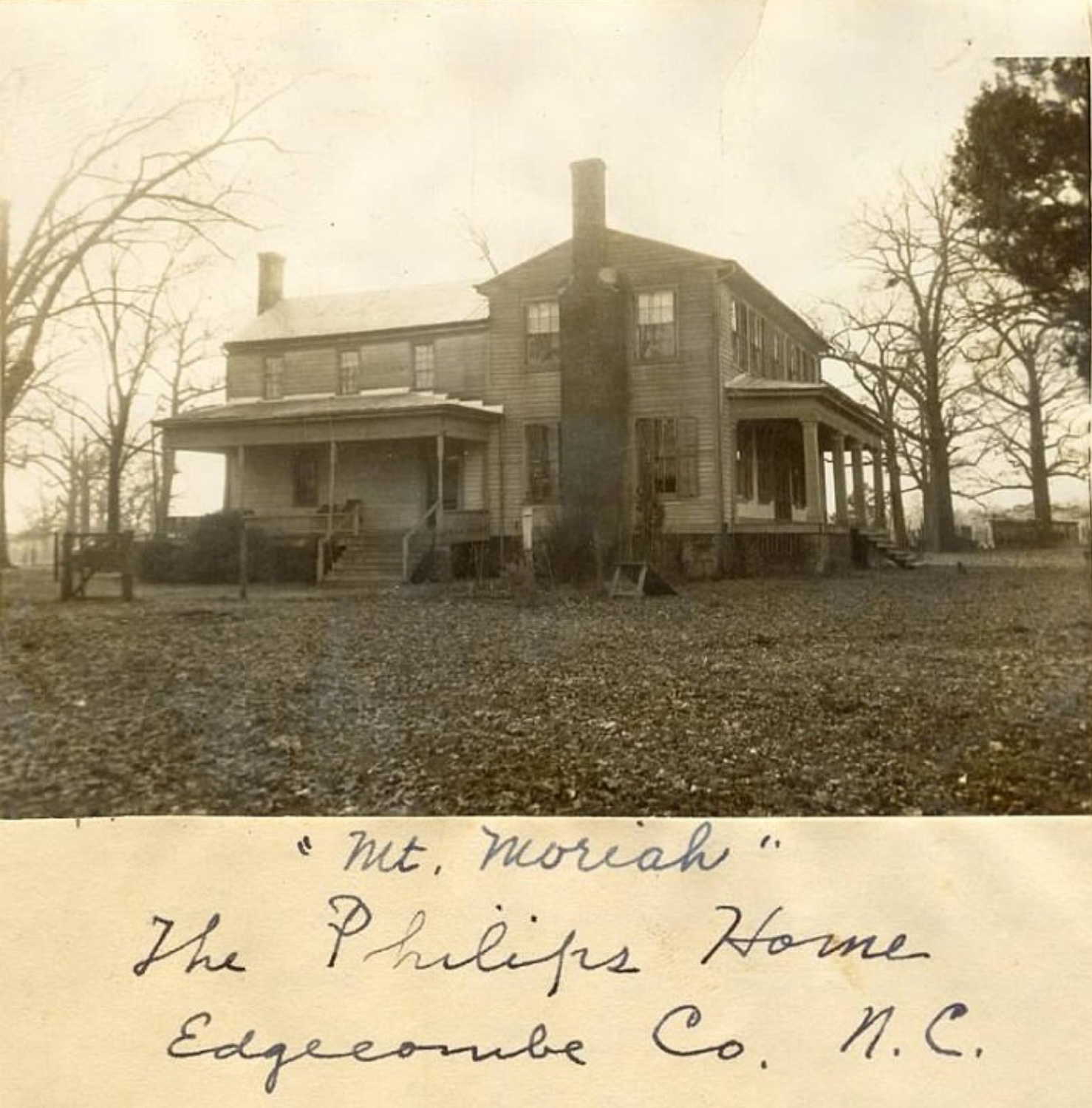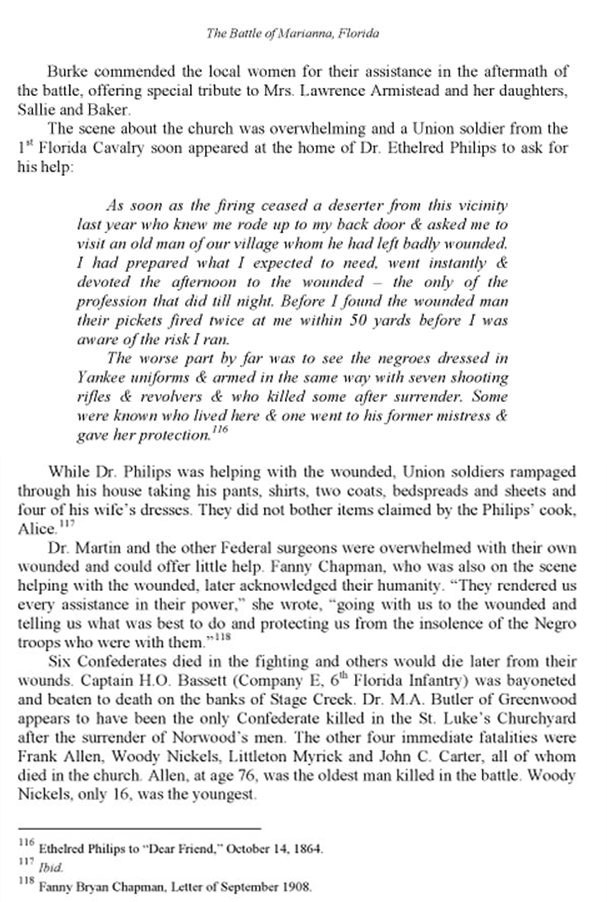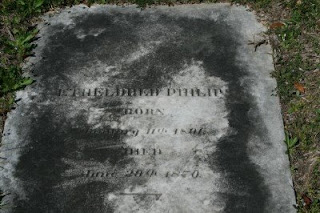|
|
Dr. James Jones Philips
Born 1798, died 10 Apr 1874
Married Harriet Amanda Burt
|

Below picture on the
left from Mitchell Woodard This framed painting was given to her father, James Philips Woodard because
he had the same name. He is a son of William C. Woodard and Katherine Bunn.
Katherine is a daughter of Hariett Amanda Philips and Benjamin H. Bunn. Hariett
is a daughter of James Philips who appears in the painting.
Dr. James Jones Philips is buried in the Philips Family Cemetery located on his home place at Mount Moriah
plantation in Battleboro, Edgecombe County, NC

Mount Moriah Plantation was the home of Dr. James Jones Philips and his wife Harriet Amanca Burt Philips. The farm was put
together by him over a period of 40 years and included about 3,000 acreas. It is in Edgecombe County, NC
The farm takes its name from a two story Masonic Lodge Hall that stood about 100 ft. northeast of the present dwelling.
Today only foundation traces remain but this structure served two purposes. The second floor was used for fraternal rites
and meetings. The shenanigans on the second floor when they held their initiations involved Billy goat rides and all kins
of horseplay. The first floor was an elementary school for the plantation children.
The house itself has two parts. The oldest part is the small back room, narrow stair and low ceiling upper rooms and it
was moved to its present site from a hill near Moccasin Branch where the family graveyard is. This part dates to 1810-14.
One of the existing outbuildings also dates to the early 1800s. The house has marble mantels, much carving, old window panes
and handmade iron hinges.
The front of the house is the grander part and includes a portico and two rooms up, two down with high ceilings. It was
added in time for the oldest child's wedding. (Sally Tart Philips to Francis Marion Parker) December 7, 1851.
The farm has remained in the family although it had been divided among the Philips children who built houses surrounding
the homeplace. At present it is owned by the Marrows of Tarboro, N

The above photos present a photographic essay of a very intact, antebellum plantation house and its many outbuildings, including
detailed pictures of interior detailing and features. Although unrestored, the house is still owned by members of the original
family that built this fine house and who ensure that it is watched by caretakers to protect it from major decay and intruders.
The front section of the house is Greek Revival and was built around 1850 as a major expansion for a growing family who had
been living in the 1820's Federal house that still has most of its intact, early 19th century details at the rear of the large
house.

Southside Virginia Families
By John Bennett Boddie, Pages 350-356
Dr.
James Jones Philips, born 1798, died April 10, 1874, M.D. University of Pa. , successful physician and planter. About 1828
he purchased a plantation in the northwestern part of Edgecombe County, 7 miles from the original Philips settlement on Swift
Creek, which he called "Mount Moriah". He married April 23, 1834 Harriet Amanda Burt, born August 4, 1817, died Sept. 28,
1890, the daughter of William Burt and his wife Susan Sims of Hilliardston, Nash County, N.C. Dr. Philips and his wife are
buried in the family graveyard at "Mount Moriah".
Issue of James Jones Philips and his wife Harriet Burt.
I. Sally
Tart Philips, born March 22, 1835, m. December 7, 1851 Col. Francis Marion
Parker, C.S. A. , son of Theophilus Parker of Tarboro and his wife Mary Toole.
They had issue:
1. Mary Parker m. Joseph John Battle. (Battle Book)
2. James Philips Parker, born 1855.
3. Theophilus Parker, born 1857, died 1920 unmarried.
4. Harriet Burt Parker, born 1860, m. Peter Arrington Spruill.
They had issue:
(1) Peter A. Spruill, died France 1918.
(2) Mary James Spruill, d. s. p.
(3) William E. Spruill, m. (1) Florence Chalk; (2) Mary Ann Battle.
(4) Frank Barker Spruill, married Frances Philips, of whom later.
5. Haywood Parker, born 1864 of Ashville, N.C., m. Josephine Patton .
6. Francis Marion Parker, born 1867, died unmarried 1913.
7. Sally P. Parker, born 1870
8. Kate D. Parker, born 1873.
9. Frederick M. Parker, born 1875.
II. Susan
Sims Philips, born March 6, 1836, died in infancy.
III. Frederick Philips, born June 13, 1838, prominent
lawyer and judge, Tarboro, N.C. died June 14, 1905, m. 1864 Martha S. Hyman, 1840-1925, daughter of Henry Hyman and Martha
E. Porter.
They had issue:
1. Anne D. Philips, born May 16, 1866, m. October 22, 1890 Herbert Worth Jackson of Richmond,
Va.
2. Mary Philips, married Hal. Wood of Edenton.
3. James Jones Philips, born 1869.
4. Martha Hyman Philips, married Dr. Woodward (sic).
5. Josephine Philips, born October 26, 1878, married April 27, 1905, Albert Pike of Rockbridge
County, Va.
6. Lela Burt Philips, married James D. Gillam.
7. Frederick Philips.
8. Henry Hyman Philips, married Ethel Skinner.
IV. Susan Sims Philips, second of the name, born
September 15, 1842, m. Feb.19, 1861, Joseph John Battle as his first wife.
V. William
Burn Philips, born March 26, 1844, died Jan.29,1856.
VI. Joseph Battle Philips, born Jan.8, 1848, m.(1)
Pattie Battle (2) Mary Marriott. See Battle Book for descendants of both marriages.
VII. John Ward Philips, born Jan.31, 1850, of whom
later.
VIII. Harriet Amanda Philips, born October 18, 1851,
m. Nov.7, 1870, Hon. Benjamin Hickman Bunn, Member of Congress and prominent in local civic affairs. He was the son of Redmond
Bunn of "Benvenue", Nash County, N.C., and his wife Mary Bryan.
Harriet Philips and Benjamin H. Bunn had issue:
1. Mary Bryan Bunn m. George Lewis of Wimberly, M.D. and had issue.
2. Harriet Amanda Bunn, d.s. p.
3. James Philips Bunn, atty in Rocky Mount, N.C. m. Ella Lee Moorman and had issue.
4. Elizabeth Bunn - unmarried.
5. Redmond Bunn, d. s. p.
6. Benjamin H. Bunn m. Mavis Lindsey and had issue.
7. Laura Maud Bunn m. Kemp Davis Battle. (See S.V. F. p. )
8. Katherine Bunn m. William Coleman Woodard of Rocky Mount. 5 children.
IX.
Laura
Maud Philips, born July 1, 1853, m. 1873, John Peter ARRINGTON.
X.
Elizabeth
Jane Philips, born May 4, 1855, m. George Cullen Battle on November 10, 1875. See Battle Book for descendants.
XI.
Xl.
Martha Parker Philips, born Jan. 18, 1857, died in infancy.
XII.
Walter
Everett Philips, born July 17, 1860, died unmarried May 2, 1939.

The farm hands were employed in digging the marl when there was no other work to be done. Then, early in the year it
was hauled into the fields and composted in large piles, with cottonseed, mud from the swamps, the scrapings of the fence
corners, the bodies of any domestic animals that had died on the farm, and whatever else came to hand. Commercial fertilizers
were but little known when this improvement began. After their introduction they were often used in the compost heaps. Such
was the enthusiasm for compost, that sometimes an old and useless animal was killed for the purpose of making compost; and
no horse, ox, hog, or other animal that died, was left for the turkey buzzards on a well regulated plantation. Old
Dr. James J. Philips once inquired of his Negro foreman, “Luke,
what has become of my old jinny [local name for a female donkey]? I have not seen her for some time.”
“Lord,
master,” replied Luke, “she wa'n’t no ’count. She done been wore out long ago. I knocked her in the
head and put her in a compost pile.”

J. Kelly Turner and John L. Bridges, Jr.
Published 1920

In 1850 the society was reorganized and highly commended by the Norfolk Daily News. The Agricultural Society celebrated
its first anniversary in 1851 by the delivery of an address by John L. Bridgers, who by his industry, perseverance, and talents
was among the foremost in this work. Edmond Ruffin, of Virginia, also took an active part in this work for several years.
Under
the guidance of this society, composed of the best farmers of the county, great good resulted in this section of the State.
In a few years Edgecombe and Tarboro began a bright career and enjoyed prosperity and contentment. James
Philips, an able chemist, was the first to introduce scientific
methods of farming in the county. In 1852 he delivered an address before the Agricultural Society, which was later published
in the Farmers Journal. In his address Dr. Philips
gave an exposition of analytical chemistry as applied to farming. His ideas were later adopted with much profit.

Collection Number: 00972
Collection Title: James Jones Philips Papers, 1814,
1832-1892.
James Jones Philips was a physican and scientific farmer of Edgecombe County, N.C., and his cousin Ethelred Philips (1801-1870) was a physician and farmer of Mariana, Fla. The collection is
chiefly letters from Ethelred Philips to James J. Philips. Many of them contain instructions to James in his capacity as the
manager of Ethelred's business affairs in North Carolina. Letters often include information on crop yields, prices, and other
aspects of the agricultural economy. Ethelred commented on a variety of subjects, including succession and his sympathy for
the Union, the Confederate government, censorship, the problems of democracy, and post-war problems. He also discussed religion,
philosophy, and the need for church reform and modernization; health care, including reports of various epidemics, his own
ill health, and the medicial benefits of brandy, which he apparently liberally prescribed for himself; and relationships with
slaves and freedmen. There are also a few letters to and from James J. Philips, Jr. (d. 1865) and other family members. Also
included are accounts of James J. Philips; a physician's record book, 1832-1835; and an 1871 book of accounts with laborers.
There is also an account book containing estate records, 1849-1858; accounts with Ethelred Philips, 1856-
1869; and accounts with slaves and freedmen, 1859-1860 and 1867-1870.
Papers of James Jones Philips (1798-1874), physician and
scientific farmer,
of Edgecombe County, N.C., and his cousin
Ethelred Philips (1801-1870), physician and farmer of Marianna, Fla.
The bulk of the materials are letters from Ethelred Philips to James J. Philips. Many of them contain instructions
to James in his capacity as the manager of Ethelred's business affairs in North Carolina. Letters often contain information
on crop yields, prices, and other aspects of the agricultural economy.
Their primary value, however, lies in their portrayal of the views and opinions of an articulate, pro-Union Southerner.
Ethelred Philips commented on a variety of subjects, including the political issues of the day--secession, the Confederate
government, censorship, problems with democracy, and reconstruction; religion and philosophy, and the need for church reform
and modernization; health care--reports of various epidemics, his own ill health, and the medicinal benefits of brandy, which
he apparently frequently used himself; and relationships with slaves and freedmen. There are also a few letters to and from
James J. Philips, Jr. (d. 1865), and other family members. An 1892 biographical sketch of Dr. James J. Phillips(sic) and an
undated "fishing tale" are filed in Series 1.
Also included are three volumes containing medical records and accounts of James J. Philips. Volume 1 is a physician's
record book (1832-1835). Volume 2 is an account book of James J. Philips with several estate records, 1849-1858, records with
Ethelred Philips, 1856-1869, and accounts with slaves and freedmen, 1859-1860 and 1867-1870. Volume 3 is an 1871 book of accounts
with laborers. There are also a few miscellaneous receipts.
The collection is arranged as follows:
Series 1. Correspondence and Other Items
Series 2. Medical Records
Series 3. Account Books and Receipts
SERIES
DESCRIPTIONS
Series 1. Correspondence and Other Items
About 55 items. 1854-1892.
The bulk of the letters
in this collection are from Ethelred Philips to his cousin James J. Philips. Many of them contain instructions to James in
his capacity as the manager of Ethelred's business affairs in North Carolina. Letters often contain information on crop yields,
prices, and other aspects of the agricultural economy. Their primary value, however, lies in their portrayal of the views
and opinions of an articulate, pro-Union Southerner. Ethelred Philips commented frequently on political issues of the day;
including secession, the Confederate government, censorship, problems with democracy, and reconstruction; religion and philosophy,
and the need for church reform and modernization; health care, including reports of various epidemics, his own ill health,
and the medicinal uses of brandy and whiskey; and relationships with slaves and freedmen.
There are also a few letters to and from James J. Philips, Jr. (d. 1865), and other family members. An 1892
biographical sketch of Dr. James J. Phillips(sic) and an undated "fishing tale" are filed in folder 3.
Folder 1 1854-1860
2
1861-June 1865
3 July 1865-1881, 1892, and undated
Series 2. Medical Records
2 items. 1831-1835 and undated.
A
book of accounts (volume 1) with many of the leading families of Edgecombe and surrounding counties for physician's
services and drugs. Some of the patients included may have been slaves. There is also an undated cure for what is termed "the
eating cancer."
Folder 4 Volume 1
Series 3. Account Books and Receipts
9 items. 1814, 1849-1877.
Two
account books (volumes 2 and 3) and receipts of James J. Philips. Volume 2 includes Philips's accounts as an administrator
of the estate of Bennett Bunn, 1849-1851, and several other estates, 1851-1858; provisions supplied to slaves, 1859-1860;
accounts with Ethelred Philips, 1856-1869;
miscellaneous accounts, 1863-1865; and accounts with freedmen, 1867-1870. Volume
3 includes Philips's accounts with hired laborers and records of days lost and provisions advanced to them. The miscellaneous
receipts include an 1814 court receipt for Hope Adams (apparently a distant relation), a Confederate bond, two Confederate
tax-in-kind forms, and an 1881 railroad receipt.
Folder 5 Volume 2, 1849-1870
6 Volume 3, 1871-1877
7 1814, 1864-1865,
1888
So far I've been unable to identify the exact relationship of this Dr. Etheldred Philips
with the rest of the Philips family. I notice that the record of his MD degree below spells his name Etheldred while
several of the other references spell it without the "d". I suspect this is just an error as the name Etheldred is not
used often, if ever, today and is easy to mispell. Even the story of his tombstone spells his name without the "d" even
though the "d" is clearly shown on the tombstone.

|


